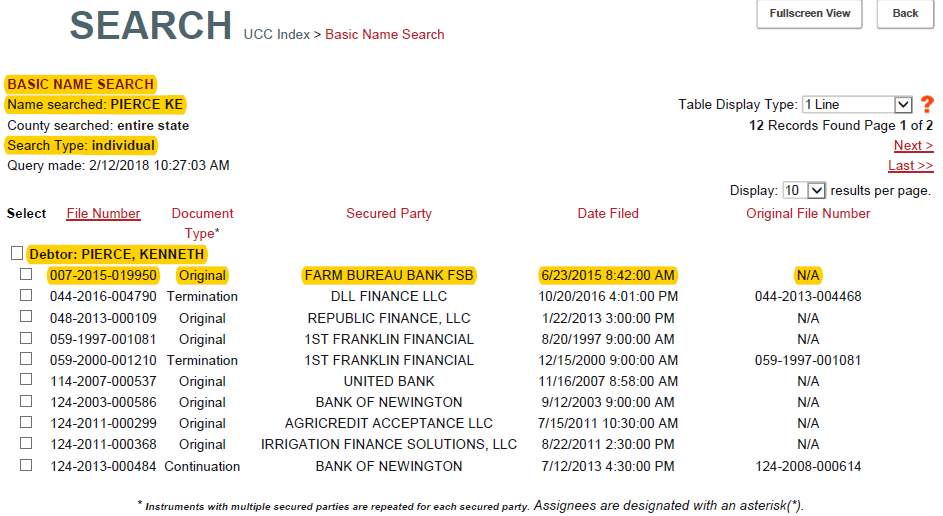
Security Interests (UCC Filings) in Liquor Licenses OK in Pennsylvania
Yes, creditors can take a secured interest in a debtor’s liquor license in Pennsylvania, according to one recent Bankruptcy Court decision.
The Case
In 2014, M&T Bank (M&T) loaned B&M Hospitality (B&M) $85,000. In consideration of the loan, M&T executed a Security Agreement and filed a UCC-1, identifying the collateral as B&M’s liquor license.
In 2017, B&M filed for bankruptcy protection under Chapter 7 and, subsequently, a Bankruptcy Trustee (Trustee) was assigned to the case.
In bankruptcy proceedings, the essential role of the Trustee is to take charge of the debtor’s estate. Some responsibilities include managing the liquidation of the debtor’s assets and ensuring proper distribution of the proceeds to the various creditors.
In this case, the Trustee filed a motion to liquidate B&M’s assets and the Trustee stated there were no liens on the liquor license. As you can imagine, M&T piped up and provided proof of its security interest in B&M’s liquor license.
Eventually, the Trustee and M&T agreed the liquor license would be sold for $175,000. However, until the court confirmed whether M&T’s security interest was valid, the Trustee would escrow the amount owed to M&T ($55,166.54) from the proceeds of the sale.
Arguments Before the Court: Can a Security Interest in a Liquor License Exist?
The two primary questions brought before the court were whether Pennsylvania law permitted the granting of a security interest in a liquor license and whether M&T properly perfected its security interest.
First, can a liquor license be collateral for a security interest?
The Trustee believed no security interest exists, because prior to the 1987 amendments, the Pennsylvania Liquor Code provided “…that liquor licenses constitute a privilege and not property.”
Unfortunately for the Trustee’s argument, in 1987 there was an amendment to the Pennsylvania Liquor Code, which defined a liquor license as “property between third parties and the licensee.” This amendment has not changed, and the Liquor Code still identifies a liquor license as property.
“The plain language of the 1987 amendment characterizes a liquor license as property between a licensee and a third party and as a privilege between a licensee and the Board. 47 P.S. § 4-468(d)… based solely upon the text of the 1987 amendment, the Court concludes that, as between a licensee and a third party, a liquor license constitutes property under Pennsylvania law.”
And, as we know, UCCs are all about perfecting a security interest in personal property!
Second, is a security interest valid if the collateral description on the Financing Statement is different than the collateral description on the Security Agreement?
Next the Trustee argued that M&T failed to properly perfect its security interest, because M&T didn’t specifically call out the liquor license in the collateral description on the UCC Financing Statement. Although, M&T did call out the liquor license in its Security Agreement.
Let’s look at the collateral descriptions on the UCC and the Security Agreement:
UCC Financing Statement
“all assets of the debtor, whether now existing or hereafter acquired or arising, wherever located”
Executed Security Agreement
“general intangibles limited to that certain restaurant liquor license number R-1140 issued by the Pennsylvania Liquor Control Board” and “all proceeds of collateral of every kind and nature in whatever form, including, without limitation, both cash and noncash proceeds resulting or arising from the sale or other disposition by the Borrower of the collateral.”
Does the collateral description, in either document, meet the three keys? The judge reviewed the case against these three requirements:
(1) value has been given,
(2) the debtor has rights in the collateral or the power to transfer rights in the collateral to a secured party, and
(3) the debtor has authenticated a security agreement which provides a description of the collateral
Has value been given? Yes!
Does the debtor have rights to the collateral? According to PA law, yes!
Does the Security Agreement identify the collateral? Indeed, it does!
The Court Says: Drink Up!
M&T took the proper steps and perfected its security interest, and the court determined M&T should be paid with the proceeds of the sale of the debtor’s assets.
“Ultimately, Pennsylvania law clearly allows third parties to create security interests in Liquor Licenses. M&T followed all the requirements to create and perfect a lien on the Liquor License and is entitled to proceeds from its sale in the amount of its secured claim.”











